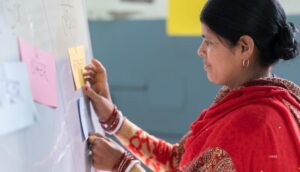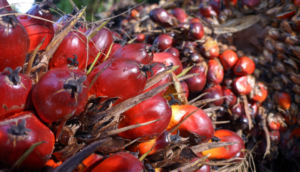Tanzania is a country of farmers. Most farmers own less than one hectare of land to grow produce to feed their families, whatever surplus they generate is used to fund their children’s education, healthcare and family emergencies. Small holder farmers are already vulnerable to crop failure, drought and poverty and this will be confounded by a changing global climate.
However, even with a very small plot of land farmers can increase their output of produce to sell in the market substantially, by investing in productivity enhancing seeds, tools, fertilisers and new knowledge. The challenge that these farmers have is getting access to the products and knowledge they need, when they live in isolated rural areas. Government agricultural extension workers are few and far between and the mainstream private sector companies feel they can’t serve this market profitably.
BRAC is running a project in Tanzania that is trying to change this situation. The LEAD (or Livelihood Enhancement through Agricultural Development) project is a collaborative endeavour between BRAC and the UK Department for International Development (DFID) to stimulate the private sector in Tanzania to serve smallholder farmers – with a particular focus on the maize and poultry sectors and value chains. The project takes the following strategies:
- A part grant and part loan investment fund for small businesses to take the shared risk of growing their market with smallholder farmers.
- Technical support to farmers to increase their productivity of maize and poultry – focused around demonstration farms that promote new approaches for farmers.
- Training for small businesses to help them develop business models and services for smallholder farmers.
- Loans for farmers to invest in productivity enhancing inputs – such as high yielding seeds, fertilisers and poultry.
Photo: Jofrey Fadhili in his shop
Jofrey Fadhili has a small shop in Mwanza in northern Tanzania selling products such as animal feeds and medicines. Jofrey has been trained by BRAC and received a loan to help him increase his stock. Jofrey is very clear that his business is more than just sitting in a shop and providing products. He has developed an effective advisory service for his customers, he says ‘what I do is more than sell. I also take the chance to advise them in how to use the products and discuss the challenges they have in the field’. Jofrey has established a network of sales agents and advisors in rural areas around Mwanza because he says, ‘the biggest challenge I face is how to reach the farmers as I have to travel at my own cost’. He considers it vital for his business that his farmer clients are successful with his products; ‘if they see my products working they will come back’
The LEAD project is currently working with 72 small businesses like Jeffrey’s and is starting to demonstrate to the larger agricultural input businesses that there is a viable market in serving smallholder farmers.
Programme Manager Hem Roy says ‘LEAD is trying to address the core constraints of input and output markets by providing financial and technical support to private businesses in the maize and poultry market systems. These businesses are expanding the quality, quantity and variety of products and services. Our aim is that by growing their customer base, which includes smallholder farmers, their businesses will grow while also benefiting farmers.’










